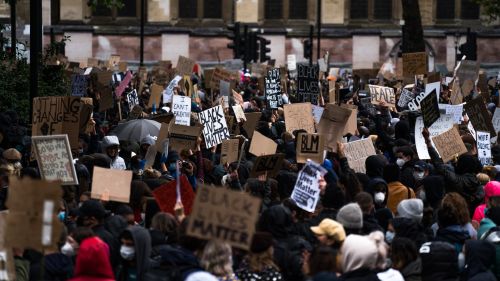Republicans and Democrats Divide on Key Debate Issues
James Eades

2020 Chicago Council Survey findings illuminate partisan divides in views on COVID-19, race, climate change, and national security.
The final debate between presidential candidates Joe Biden and Donald Trump will take place this Thursday. The topics to be addressed include fighting COVID-19, race in America, climate change, national security and leadership. The 2020 Chicago Council Survey illuminates how self-described Democrats and Republicans feel about these issues:
Fighting COVID-19
- Nine in ten Democrats (87%) view the coronavirus pandemic as the top threat facing the United States compared to only half of Republicans (48%), a difference of 39 percentage points. Republicans rate the pandemic 9 out of 15 possible threats.
- Regarding the handling of the COVID-19 pandemic, Republicans (63%) are much more likely than Democrats (21%) to say that the US government has been effective in dealing with this threat.

Race in America
- There are large partisan divides on the magnitude of the threat posed by racial inequality. Nearly three quarters of Democrats (73%) say that racial inequality is a critical threat to the country, on par with climate change (75%) and just below the coronavirus pandemic (87%). Eight in ten say the US government is doing an ineffective job on the issue of racial inequality.
- By contrast, just 23 percent of Republicans say that racial inequality is a critical threat. For GOP supporters, racial inequality, climate change (21%) and economic inequality (21%) are the three items rated the least critical of the 15 items presented. Half (49%) say the US government is doing an effective job in addressing racial inequality.
Climate Change
- Of all the issues presented in the 2020 Chicago Council Survey, none elicits greater partisan disagreement than climate change. Three-quarters of Democrats (75%) consider climate change a critical threat while less than one-quarter (21%) of Republicans see it the same way – a 54 percentage point partisan gap.
- Just 15 percent of Democrats see the US government as effective in its handling of climate change compared to 47 percent of Republicans.
- Explore more data on climate change.
National Security
- Republicans are more likely to consider traditional security threats like the development of China as a world power (67%) and international terrorism (62%). A majority also consider large numbers of immigrants coming into the country (54%)
- In contrast, most Democrats see critical threats in global and domestic issues like the COVID-19 pandemic (87%), climate change (75%), and racial inequality in the United States (73%).
- A vast majority of Democrats (80%) say the COVID-19 outbreak has increased the importance of the United States coordinating and collaborating with other countries to solve global issues.
- In contrast to the Democrats, a majority of Republicans (58%) believe the COVID-19 outbreak has made it more important for the United States to be self-sufficient as a nation.
Leadership
- Majorities of both Republicans (54%) and Democrats (78%) say that the United States should play a shared leadership role in the world. Another four in ten Republicans (38%) say that the United States should be the dominant leader while just 16 percent of Democrats agree.
- A majority of Democrats (69%) and a plurality of Republicans (42%) say that the United States should be more involved in addressing the world’s problems.
- Asked whether they agree with the statement that the United States is rich and powerful enough to go it alone without getting involved in the problems of the rest of the world, a large majority of Democrats agree (73%) while Republicans are fairly split between disagreement (52%) and agreement (48%).
- For Republicans, a majority believe that the United States is the greatest country in the world (80%) while a third of Democrats agree (35%). Instead, Democrats are more likely to believe that the United States is no greater than other nations (64%, 20% Republicans).
About the Author
Senior Fellow, Public Opinion and Foreign Policy

Dina Smeltz, a polling expert, has more than 25 years of experience designing and fielding international social and political surveys. Prior to joining the Council to lead its annual survey of American attitudes on US foreign policy, she served in the Bureau of Intelligence and Research at the US State Department's Office of Research from 1992 to 2008.
